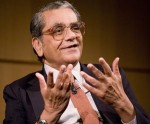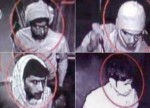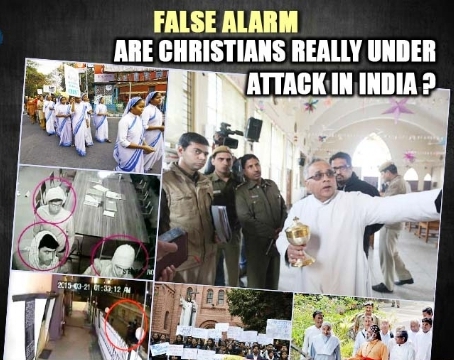https://bharatabharati.wordpress.com/2015/04/03/christians-are-being-used-not-abused-swapan-dasgupta/
https://bharatabharati.wordpress.com/2015/04/03/christians-are-being-used-not-abused-swapan-dasgupta/
 “The fact that neither Mr Rebeiro nor Adm. Kumar have been able to give satisfactory explanations as to why they have suddenly gone public with their fears over the citizenship rights of Christians has, in turn, prompted a number of conspiracy theories. There are accusations flying all over social media that the Churches have taken a conscious decision to target the Modi government politically, first by attributing political motives to every incident involving a church building or individual Christians and, second, by enlarging its significance to suggest that an entire community is under attack.” – Swapan Dasgupta
“The fact that neither Mr Rebeiro nor Adm. Kumar have been able to give satisfactory explanations as to why they have suddenly gone public with their fears over the citizenship rights of Christians has, in turn, prompted a number of conspiracy theories. There are accusations flying all over social media that the Churches have taken a conscious decision to target the Modi government politically, first by attributing political motives to every incident involving a church building or individual Christians and, second, by enlarging its significance to suggest that an entire community is under attack.” – Swapan Dasgupta
 The most comic fallout of Jagdish Bhagwati’s interview to NDTV about the spuriousness of the brouhaha over persecution of Christians in India may yet happen if his great economist rival Amartya Sen decides to publicly assert the opposite. So far the outgoing chancellor of the controversy-gripped Nalanda University has chosen to remain silent. But I am sure that the pressure on him to stand up and repeat Pastor Martin Niemoller’s “First they came for the Jews…” must, presumably, be intense.
The most comic fallout of Jagdish Bhagwati’s interview to NDTV about the spuriousness of the brouhaha over persecution of Christians in India may yet happen if his great economist rival Amartya Sen decides to publicly assert the opposite. So far the outgoing chancellor of the controversy-gripped Nalanda University has chosen to remain silent. But I am sure that the pressure on him to stand up and repeat Pastor Martin Niemoller’s “First they came for the Jews…” must, presumably, be intense.
Let’s be clear on one point: the opponents of Narendra Modi have smelt blood and seem determined to pursue their single-minded campaign to suggest that a majoritarian madness has gripped India. Earlier, and particularly during the 2014 general election, this campaign had seen the outpourings of anguish on the part of intellectuals and a small section of the media. On his part,
Mr Modi had (and has) provided absolutely no ammunition to substantiate the fear that the multi-religious character of India would be jeopardised by the exit of a Congress-led government. True, there was a pre-existing Hindu-Muslim faultline that manifested itself in the minority community staying away from the BJP. However, in the first 11 months of the Modi government, the concerns have been on the relative inadequacy of Muslim political representation rather than the security of the community. Even on this count, there was consternation among professional secularists that the Bharatiya Janata Party and the People’s Democratic Party managed to forge a coalition in Jammu and Kashmir.
 Under the circumstances, the so-called fear that is said to have gripped the Christian community following some small incidents has come as a surprise. What is even more unexpected is that these have become the occasion for a number of prominent Indian Christians to agonise over the community’s future in India. First there was the retired police officer Julio Rebeiro who asked whether he had become an alien in his own country. Subsequently,
Under the circumstances, the so-called fear that is said to have gripped the Christian community following some small incidents has come as a surprise. What is even more unexpected is that these have become the occasion for a number of prominent Indian Christians to agonise over the community’s future in India. First there was the retired police officer Julio Rebeiro who asked whether he had become an alien in his own country. Subsequently,  former Navy Chief Adm. Sushil Kumar (Retd.) expressed a fear that the “communal virus” could affect the camaraderie of the armed forces — a grave concern in view of the fact that the armed forces have always been well and truly insulated from all political schisms. Finally, various functionaries of reputed Christian education institutions have added their voices to the campaign over Christian persecution. Indeed, there is now every possibility that international Christian voices could be added to the list of those who question the ability of the Modi government to maintain religious harmony.
former Navy Chief Adm. Sushil Kumar (Retd.) expressed a fear that the “communal virus” could affect the camaraderie of the armed forces — a grave concern in view of the fact that the armed forces have always been well and truly insulated from all political schisms. Finally, various functionaries of reputed Christian education institutions have added their voices to the campaign over Christian persecution. Indeed, there is now every possibility that international Christian voices could be added to the list of those who question the ability of the Modi government to maintain religious harmony.
I don’t think it will be exaggeration to suggest that the charge of Christian vulnerability has been greeted with a sense of disbelief in most of India. While the BJP’s political opponents may delight over any discomfiture felt by the government, particularly anything that shifts attention from the main agenda of economic reconstruction, the use of the tiny Christian community as a vanguard of any anti-Modi movement has been greeted with a measure of exasperation. Was Mr Rebeiro, it is being asked, ever rewarded or discriminated on the strength of his religious faith? On what basis has Adm. Kumar suggested that the “communal virus” could also affect the well-being of the armed forces? Did he ever face discrimination because he was a Christian?
 The fact that neither Mr Rebeiro nor Adm. Kumar have been able to give satisfactory explanations as to why they have suddenly gone public with their fears over the citizenship rights of Christians has, in turn, prompted a number of conspiracy theories. There are accusations flying all over social media that the churches have taken a conscious decision to target the Modi government politically, first by attributing political motives to every incident involving a church building or individual Christians and, second, by enlarging its significance to suggest that an entire community is under attack. If this understanding of the “church agenda” is correct, it would follow that the third phase of the campaign would lie in making common cause with all the anti-Modi forces in the country.
The fact that neither Mr Rebeiro nor Adm. Kumar have been able to give satisfactory explanations as to why they have suddenly gone public with their fears over the citizenship rights of Christians has, in turn, prompted a number of conspiracy theories. There are accusations flying all over social media that the churches have taken a conscious decision to target the Modi government politically, first by attributing political motives to every incident involving a church building or individual Christians and, second, by enlarging its significance to suggest that an entire community is under attack. If this understanding of the “church agenda” is correct, it would follow that the third phase of the campaign would lie in making common cause with all the anti-Modi forces in the country.
We saw a small trailer of the third phase in the last day of campaigning for the Delhi Assembly poll when a small (but lavishly reported) demonstration of Christians became the signal for all members of the community to come out and vote against the BJP two days later.
 Whatever the real motivations of the clergy of various Christian denominations, there is no doubt that it has succeeded in putting Christians at the centre of a previously non-existent political divide. The political storm has served to resurrect subterranean schisms over religious conversions and the global links of the churches. Whether unwittingly or otherwise, Christian activism may even have prompted a large measure of countervailing reaction, much to the delight of a cynical media that seems intent on keeping the cauldron of communal politics boiling. Making Christians more aware of their religious self-identity may be a legitimate exercise on the part of community leaders. But when this results in non-Christians seeing Christians as being removed from the mainstream, the results can be self-defeating. Unless, of course, the avowed aim is to sharpen the sense of differences.
Whatever the real motivations of the clergy of various Christian denominations, there is no doubt that it has succeeded in putting Christians at the centre of a previously non-existent political divide. The political storm has served to resurrect subterranean schisms over religious conversions and the global links of the churches. Whether unwittingly or otherwise, Christian activism may even have prompted a large measure of countervailing reaction, much to the delight of a cynical media that seems intent on keeping the cauldron of communal politics boiling. Making Christians more aware of their religious self-identity may be a legitimate exercise on the part of community leaders. But when this results in non-Christians seeing Christians as being removed from the mainstream, the results can be self-defeating. Unless, of course, the avowed aim is to sharpen the sense of differences. A very dangerous game is being played by a handful whose idea of harmony is at variance with the consensual view of composite Indian citizenship. In the short-term, and thanks in no small measure to this unwarranted desire to cry wolf, we are likely to see a sharp focus on the entire issue of religious conversions — an issue that has been troubling Hindu communities in southern India. The government may feel that the emerging truth of the Ranaghat nun rape will cool passions. Unfortunately, I get an uncomfortable feeling that in the battle between propaganda and truth, the latter may become a casualty. We are not witnessing a religious conflict. These are just the opening shots of a political battle, using Christians as a human shield. – The Asian Age, 3 April 2015
A very dangerous game is being played by a handful whose idea of harmony is at variance with the consensual view of composite Indian citizenship. In the short-term, and thanks in no small measure to this unwarranted desire to cry wolf, we are likely to see a sharp focus on the entire issue of religious conversions — an issue that has been troubling Hindu communities in southern India. The government may feel that the emerging truth of the Ranaghat nun rape will cool passions. Unfortunately, I get an uncomfortable feeling that in the battle between propaganda and truth, the latter may become a casualty. We are not witnessing a religious conflict. These are just the opening shots of a political battle, using Christians as a human shield. – The Asian Age, 3 April 2015
» Swapan Dasgupta is a senior journalist in Delhi.


No comments:
Post a Comment